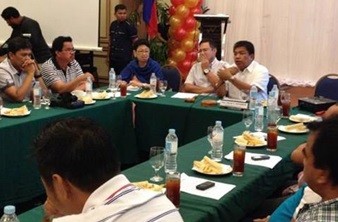
Aug. 2014—It was supposed to be a regular USAID workshop in the Philippines' Davao City to provide Autonomous Region of Muslim Mindanao (ARMM) chief executives with leadership skills to improve their local school boards. But as the day progressed, it became much more.
The meeting, held on Dec. 20, 2013, developed into an open forum for mayors to voice the challenges that they confronted in education. They clamoured to air their concerns to a higher authority, with success. Former Sarangani province Governor Miguel Dominguez soon contacted ARMM Regional Governor Mujiv Hataman to take action.
Just two weeks after this workshop, which was conducted under USAID's Education Governance Effectiveness (EdGE) program through the Synergeia Foundation, a landmark meeting was held dedicated to improving education in Muslim Mindanao. The 23 mayors participating in EdGE—representing municipalities in Maguindanao, Lanao del Sur, Sulu and Tawi-Tawi—met with Hataman as well as Department of Education ARMM Secretary Jamar Kulayaan and Assistant Secretary Noor Saada. Synergeia President Milwida Guevara and former Governor Dominguez, a Synergeia trustee, acted as third parties.
This once great divide between the regional governor and his constituents revealed itself to be a lack of confidence from both sides to initiate a conversation. Hataman extended his assistance to address the mayors’ concerns and laid down an unexpected condition. “If we are to help each other, there should be no politics involved,” he said. He ordered all ARMM school superintendents to support the education reform programs of the local government units.
“This is a very good beginning,” said Hataman. “Let's meet every quarter, provided that we continue to set goals.”
The open environment provided by the workshop encouraged the mayors to share their once unheard views without fear of bias or judgment. It was this condition that led to a meeting that will pave the way for progressive changes in education for the children of Mindanao.
The aggressive effort to involve community leaders is just one of the benefits that USAID’s EdGE program has delivered to help reinvent local school boards, improve education, and provide better opportunities for the country’s future generation.
The five-year EdGE project, which runs from 2013 to 2018, seeks to improve education governance through decentralization, with the end goal of improving learning outcomes, particularly early grade reading, for at least 1 million children.







Comment
Make a general inquiry or suggest an improvement.